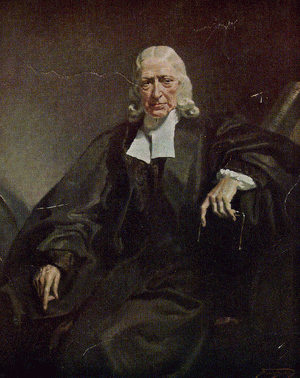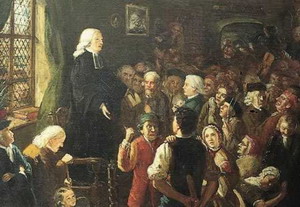John Wesley Preaches in Lurgan




 John Wesley (28 June 1703 – 2 March 1791) was an Anglican cleric and Christian theologian. Wesley is largely credited, along with his brother Charles Wesley, as founding the Methodist movement which began when he took to open-air preaching. Wesley embraced the evangelical movement, which encouraged people to experience Jesus Christ personally. Wesley's writing and preachings provided the seeds for both the modern Methodist movement and the Holiness movement, which encompass numerous denominations across the world. John Wesley (28 June 1703 – 2 March 1791) was an Anglican cleric and Christian theologian. Wesley is largely credited, along with his brother Charles Wesley, as founding the Methodist movement which began when he took to open-air preaching. Wesley embraced the evangelical movement, which encouraged people to experience Jesus Christ personally. Wesley's writing and preachings provided the seeds for both the modern Methodist movement and the Holiness movement, which encompass numerous denominations across the world.
Isaac Bullick was one of the first persons in Lurgan to be connected with the Methodist ministry and about 1770, a group
of people began meeting for Christian fellowship in his home in the Rookery (20 High Street Lurgan). These meetings continued
there until 1778 when, on the morning of 19th June, Reverend John Wesley opened a small dwelling house in Nettleton's Court, Queen
Street as the first Methodist chapel to be opened in Lurgan.
John Wesley visited Lurgan seven times. On his first visit, on 28th July 1756, he "preached to the largest congregation since he left Cork" and he asked; "Why should we despair of doing good in Lurgan also?" It was on the occasion of his second visit, on 16th May 1758, that he visited Dicky Barton's house on Bird Island, Lough Neagh. On his next two visits, 26th April 1762, and 14th June 1773, he had discussions with William Miller about his speaking statue. Wesley was ill during his visit to Lurgan on 16th/17th June 1775, and consulted Dr. Law, "a sensible and skilful physician". He described some of his Lurgan congregation, during his visit of 18th/19th June 1778, as "wild as colts untamed".
 John Wesley continued to travel the country where he mainly visited poor neighbourhoods, and most of the people who attended his meetings were industrial workers or agricultural labourers. Wesley's main message was of God's love. He told the people who attended his meetings that if they loved God in return, they would "be saved from sin and made holy". Wesley also had a lot to say about personal morality. In his sermons he encouraged people to work hard and to save for the future. Wesley also warned against the dangers of gambling and drinking. Although there were Methodist ministers, John Wesley encouraged people who had full-time jobs to become lay preachers. This gave working people valuable experience of speaking in public. Later, some of these went on to become leaders of trade unions and reform groups such as the Chartists. John Wesley continued to travel the country where he mainly visited poor neighbourhoods, and most of the people who attended his meetings were industrial workers or agricultural labourers. Wesley's main message was of God's love. He told the people who attended his meetings that if they loved God in return, they would "be saved from sin and made holy". Wesley also had a lot to say about personal morality. In his sermons he encouraged people to work hard and to save for the future. Wesley also warned against the dangers of gambling and drinking. Although there were Methodist ministers, John Wesley encouraged people who had full-time jobs to become lay preachers. This gave working people valuable experience of speaking in public. Later, some of these went on to become leaders of trade unions and reform groups such as the Chartists.
On his final visit to Lurgan on 13th June 1785, Wesley had attained the age of 82. He preached at 11.00 o'clock in the churchyard - it was on a Sunday -"the sun shone extremely hot" but the gathering "was sheltered from it, partly by the church and partly by the surrounding trees".
Wesley found time to write a large number of books during his life-time. This included collections of psalms, hymns and sermons. He also founded and edited the Methodist Magazine. Wesley received over £30,000 in royalties from his writings. This was used for charitable work including the foundation of Kingswood School in Bristol. Wesley and his followers became known as Methodists. By the time John Wesley died in 1791, the Methodist movement had over 76,000 members.
The information on this website is free and will always be so. However, there are many documents and records that we would like to show here that are only available for sale. If you would like to make a donation to the Lurgan Ancestry project, however small (or large!), to enable us to acquire these records, it would be very much appreciated. We could cover our pages in Goggle Ads to raise money, but feel that this would detract from the information we are trying to provide.
You can also help us to raise money by purchasing some of our ebooks on our sister website: www.genealogyebooks.com
The Lurgan Ancestry Project is a not for profit website, all monies raised from the site go back into it.


|

